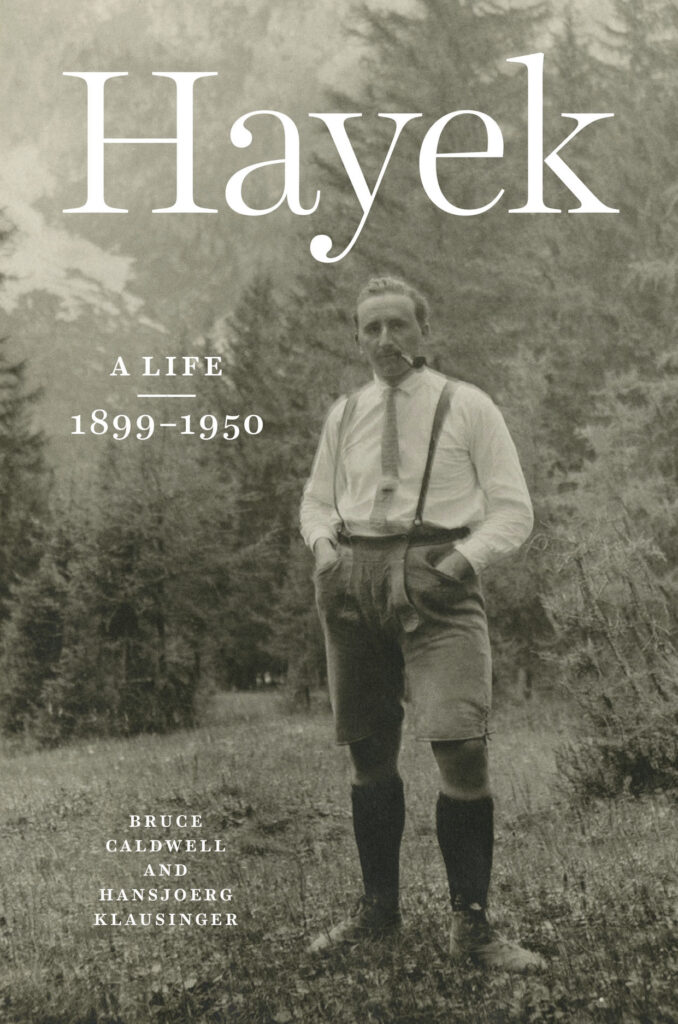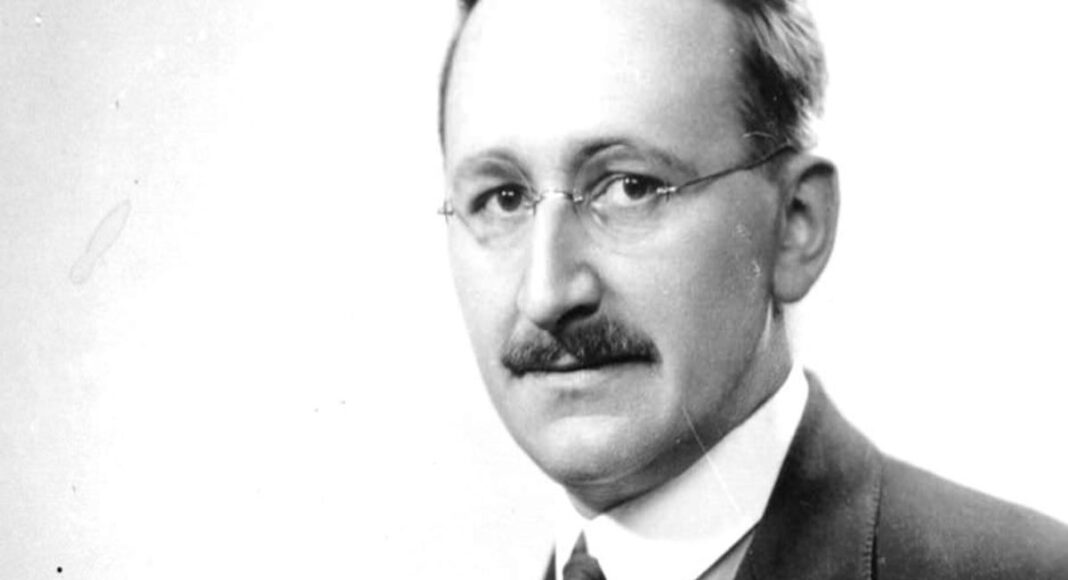In their first of two volumes, historians of economics Bruce Caldwell and Hansjoerg Klausinger access new archival material to explore the first fifty years of Friedrich Hayek, perhaps the most controversial economist of the 20th century. What follows is an excerpt from their book, “Hayek: A Life, 1899-1950,” out November 25, 2022.
The first salient fact about Friedrich Hayek is that he was born in 1899 and died in 1992. His was a twentieth-century life. As a child his first car ride, a quick trip around Vienna’s Ringstraße, was in one of the first automobiles. As a youth he took up downhill skiing, then a new sport, a modification of the more traditional Nordic cross-country one. Had World War I not ended when it did he would have joined the pilot academy and flown planes, themselves relatively new inventions. As an economist he was a participant observer in the hyperinflation that followed the First World War, the Great Depression, the rise of the welfare state, and the stagflation of the 1970s. As a liberal he watched the rise and fall of various forms of fascism on the continent. He also witnessed the creation of the Soviet Union, its expansion to control much of Eastern Europe, and its ultimate dissolution.
He lived through the transformation of his own profession from the (mostly verbal) study of political economy into the (mostly mathematical) science of economics. Like John Maynard Keynes, whom he knew, he was an economic theorist who used virtually no mathematics to express his ideas. He was made fun of by some mean-spirited colleagues for his lack of mathematical acumen (the Austrian tradition in economics was largely a verbal one), yet his treatments of what he called “phenomena of organized complexity” or “spontaneous orders” anticipated subsequent theoretical developments for which the mathematics had not yet been developed.
His contributions to economics were impressive, even if they did not always impress his economist colleagues—though they frequently did. There was a brief time in the 1930s when Hayek was considered the chief economic rival of Keynes, who was destined to become the most famous economist of the twentieth century. Their competing models of the economy and theories about the causes of, and remedies for, the business cycle held the attention of the profession as a whole, until Keynes penned The General Theory and swept the field. Hayek and Ludwig von Mises are justly famous for their critique of socialism, though for decades most economists thought that they had lost the so-called socialist calculation debate. It took the collapse of the Soviet Union and the East bloc for the power of their arguments to become more widely recognized and accepted. Though he stuck to prose, scholars working in the more technical economics of information invariably invoke as a key precursor his 1945 article “The Use of Knowledge in Society,” a phenomenon that itself gives rise to the question of whether Hayek’s “knowledge” and the profession’s “information” refer to the same thing. His 1970s essay The Denationalization of Money challenged the wisdom of granting a central bank a monopoly over the issuance of money and became a foundational work for those who explore alternative monetary regimes.
Hayek might be considered one of the last of the political economists. With some justice he called his most famous work, The Road to Serfdom, a political book. His two biggest contributions, The Constitution of Liberty and Law, Legislation and Liberty, incorporated history and political theory in exploring the set of economic, political, juridical, cultural, and social institutions that are most conducive to the establishment of a successful liberal democratic order. He did important work in the history of ideas and in social science methodology. He wrote a book on the foundations of theoretical psychology. He even tried to explain, in his last book, why so many people seemed to detest the free market system, even though it had brought about manifold increases in both wealth and personal liberty.
This brief summary does not include all of the projects that he started, or thought about, but never finished. He was perpetually coming up with new ones. Some were books, of course, and some of these were multivolume works, at least as planned: a big book on money, a two-volume treatise exposing the abuse and decline of reason, a volume on the economic calculus, this last complete with a penciled-in book cover. He hoped someday to offer a lecture course titled “An Overview of the Evolution and the System of Sciences (for Students of all Faculties)”—a project gargantuan in scope, and this was when he was twenty years old. He wanted to organize a grand debate on the feasibility of socialism, dubbed the Paris Challenge—this was when he was in his late seventies. He aspired to create a Central European University, a three-year residential college for postgraduates that would educate future leaders of the region about the merits of a liberal free market democratic order—he thought about some variant of this over and over again. There were few limits to the range of his ideas or of his ambitions.

Hayek was a cosmopolitan citizen of the world but he did not start out that way. His origins in Vienna were distinctly upper middle class, and his horizons there accordingly distinctly limited, at least until he went to university, where he learned from his new friends among the Jewish intelligentsia just how circumscribed his education had been. He spent fifteen months in America, mostly in New York City, when he was in his early twenties. He hated it, but later ended up visiting the country frequently, even living in Chicago for twelve years, dedicating the book he wrote there “To the unknown civilization that is growing in America,” an ambiguous dedication that was probably intentional, for he always was a bit ambivalent about the States. He fell in love with England before he set foot on its soil, though he came to realize that the England of the nineteenth century that he revered had all but disappeared in the twentieth. He left it in 1950 under a cloud, and never lived there again. Virtually every summer he returned to the mountains of his native Austria, the one place on the planet he felt completely at home, but the time he spent in Salzburg, from 1969 to 1977, was a disaster. Before and after his sojourn in Salzburg he and Lenerl lived in Freiburg, Germany, both times in the exact same flat. It was there that he died.
Given the many places he lived, Hayek was a perpetual stranger, a man who, on his own admission, had only a few close friends. That may have suited him just fine: when he described himself as a loner in an interview, he did not say it wistfully, he was merely observing himself and stating a fact (IB 38).If he did not make close friends easily he certainly was not lacking in social skills. Hayek not only seemed to know everyone, he got along with all sorts of people. When his daughter Christine was asked if he was the “absentminded professor” type, she said that, quite the contrary, he was very good company (at least outside of the family), recalling as evidence his behavior at the summer schools that were held in the small Tyrolean town of Alpbach in the late 1940s, where she remembered him smiling and laughing and enjoying the stimulation of the intellectual and social interaction. And indeed later in life he lamented that his loss of hearing made him appear less sociable than he actually was (Hayek 1994, 135). But it is also a fact that toward members of his own family—his first wife and children—he was often rather reserved. His father, August, once supposedly said that being intelligent and taciturn was a family trait among the males, and that well described August himself. This may have been how Hayek thought men were “supposed” to behave, but it may also have been offered as an excuse for aspects of his own interactions that he later came to regret.
Reprinted with permission from Hayek: A Life, 1899–1950 Bruce Caldwell and Hansjoerg Klausinger, published by the University of Chicago Press. © 2022 by The University of Chicago. All rights reserved.






